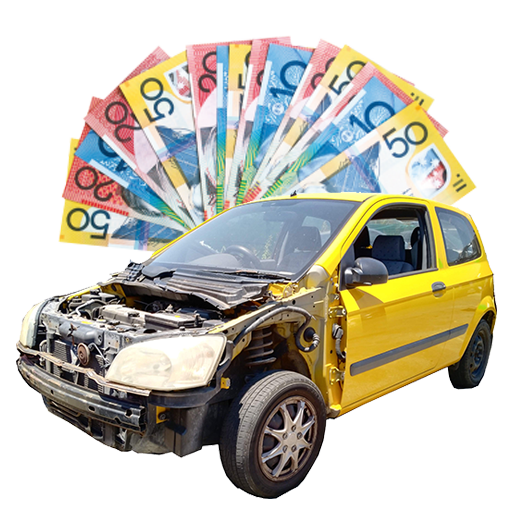That old clunker in your driveway? It’s not just an eyesore taking up valuable space—it's a resource. If you've been searching for a trustworthy "vehicle recycling near me" and want to know how to get paid for it, you've come to the right place. Let's walk through how you can turn that unwanted car into instant cash.
Why Vehicle Recycling Is a Smart Move
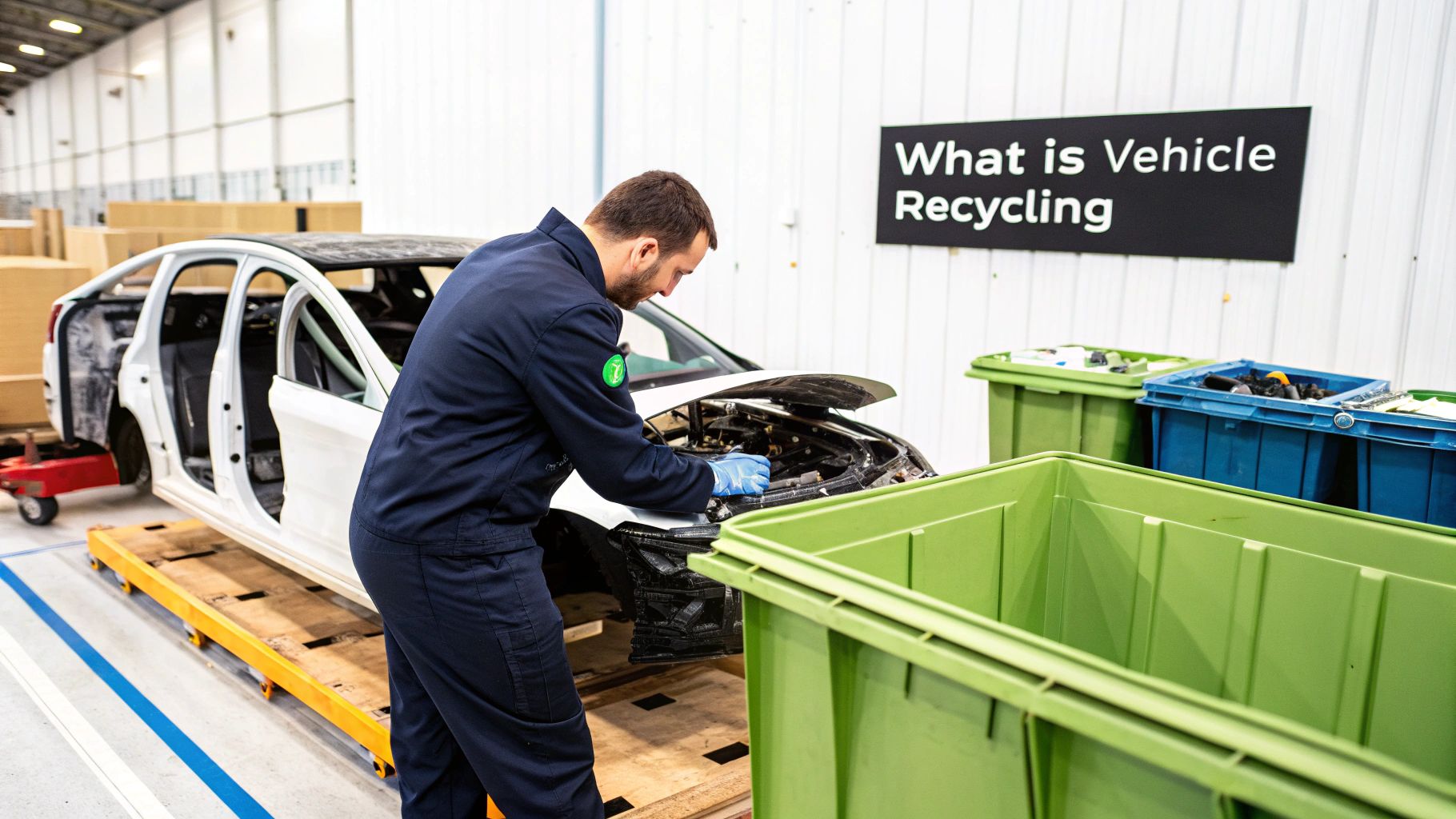
Deciding to recycle your vehicle is about much more than just decluttering your property. It’s a genuinely practical choice that packs a punch for both your wallet and the environment.
The Environmental Impact of Car Recycling
The sheer volume of vehicle waste in Australia is staggering. Every year, around 850,000 vehicles hit the end of the road, which generates a massive 1.36 million tonnes of waste. While we're getting better at this, with a material recovery rate hovering around 70%, a huge amount still ends up in landfill. This is where responsible recycling really makes a difference.
When you choose to recycle your car, you’re actively helping to:
- Conserve Natural Resources: All that steel, aluminium, and plastic in your old car can be recovered and reused. This drastically cuts down the need to mine and process brand new raw materials, which is an energy-intensive process.
- Reduce Landfill Waste: It’s a simple equation—every car recycled is one less vehicle taking up precious space in our already overflowing landfills.
- Prevent Pollution: Professional auto wreckers are experts at safely draining and disposing of nasty fluids like engine oil, antifreeze, and battery acid. This stops harmful chemicals from seeping into our soil and waterways.
The Financial Benefits of Scrapping Your Car
Beyond doing a good thing for the planet, scrapping your car puts money directly back into your pocket. Instead of watching it rust away and depreciate to nothing, you can get paid cash for its scrap value.
Our guide on how to get instant cash for cars gives you the full rundown on how the valuation process works and what kind of payout you can expect.
And for business owners, recycling old commercial vehicles can be a great way to fund new ones. It’s a good idea to explore options for business auto loans without a personal guarantee to get your next vehicle on the road.
How to Find and Vet Reputable Car Recyclers
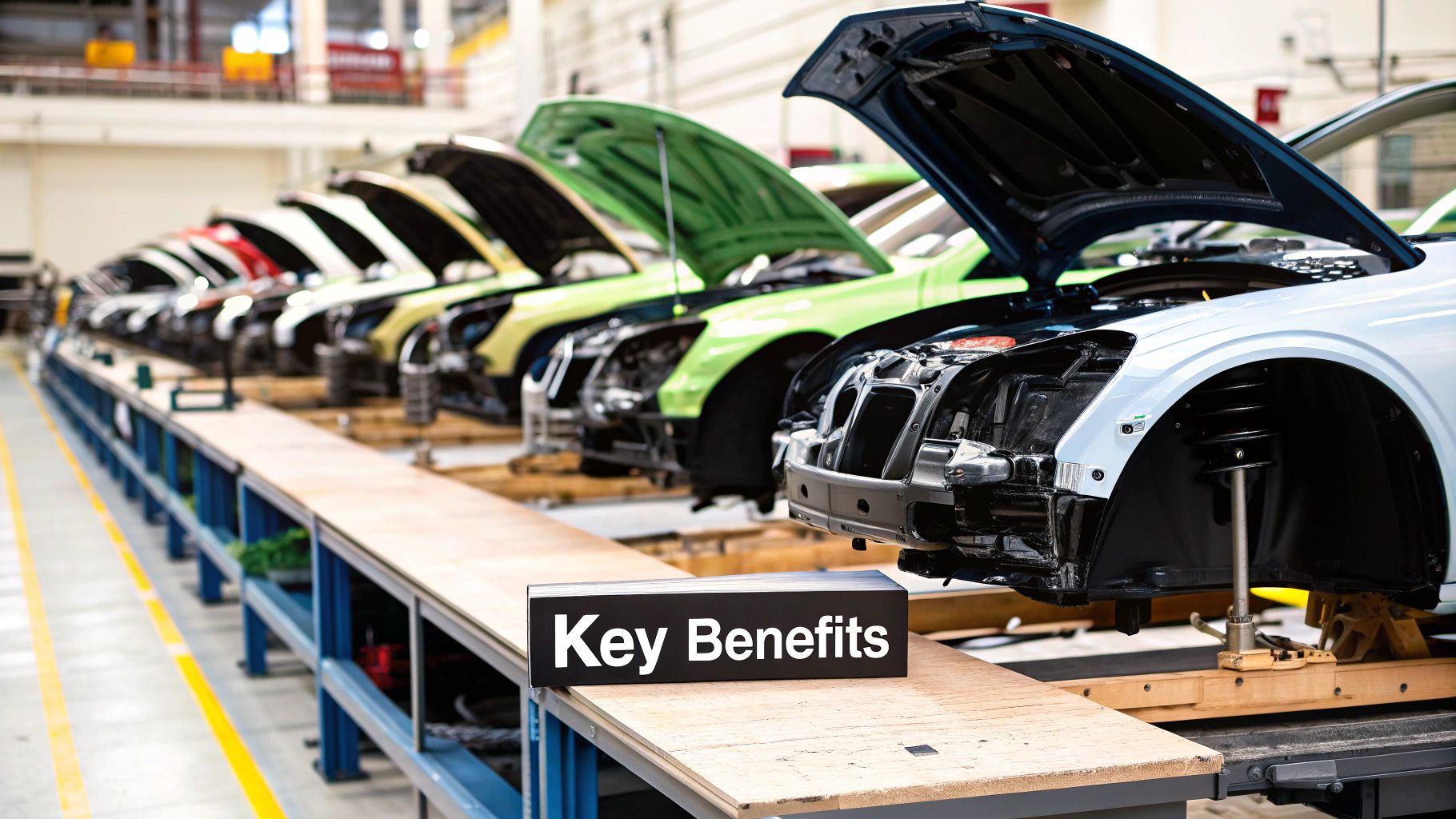
When you start searching for "vehicle recycling near me," you'll quickly realise not all services are the same. Picking the right one is absolutely crucial. A poor choice can lead to a frustratingly low offer, hidden fees, or just a whole lot of unexpected headaches. The trick is to look beyond the top search result and know how to spot a true professional.
Your first port of call should be their website. A legitimate recycler will have their physical business address and contact details clearly listed, not just a mobile number. Check for any mention of licensing, which is a good sign they’re following environmental regulations and operating above board.
After that, dive into genuine customer reviews on places like Google or Facebook. These offer a real, unfiltered look into what it's like to deal with them. Look for comments about their communication, if they showed up on time, and most importantly, if the final cash payment matched the original quote. A consistent thread of praise for their professionalism is a great sign.
Red Flags to Watch For
On the flip side, there are a few warning signs that should give you pause. Be very wary of any company that throws out a vague quote over the phone without asking for specific details about your car’s make, model, year, and condition.
High-pressure sales tactics are another massive red flag. If they're pushing you to accept an offer on the spot, it’s often because they know it’s not competitive.
A professional auto wrecker will always provide a clear, no-obligation quote based on your vehicle's specific details and the current scrap metal market. They should be completely transparent about their process and never pressure you into making a snap decision.
It’s also worth checking for their commitment to eco-friendly practices. Proper car recyclers are usually proud of how they safely handle hazardous fluids and maximise the recovery of materials. For a deeper dive into what that involves, check out our guide on automotive recycling near me.
Ultimately, you need to trust your gut. If a deal sounds way too good to be true or the person on the phone seems unprofessional, it's always best to thank them for their time and move on. Taking that little bit of extra time to vet your options ensures a smooth, hassle-free transaction and a fair price for your old car.
Getting Your Car Ready for a Smooth Pickup
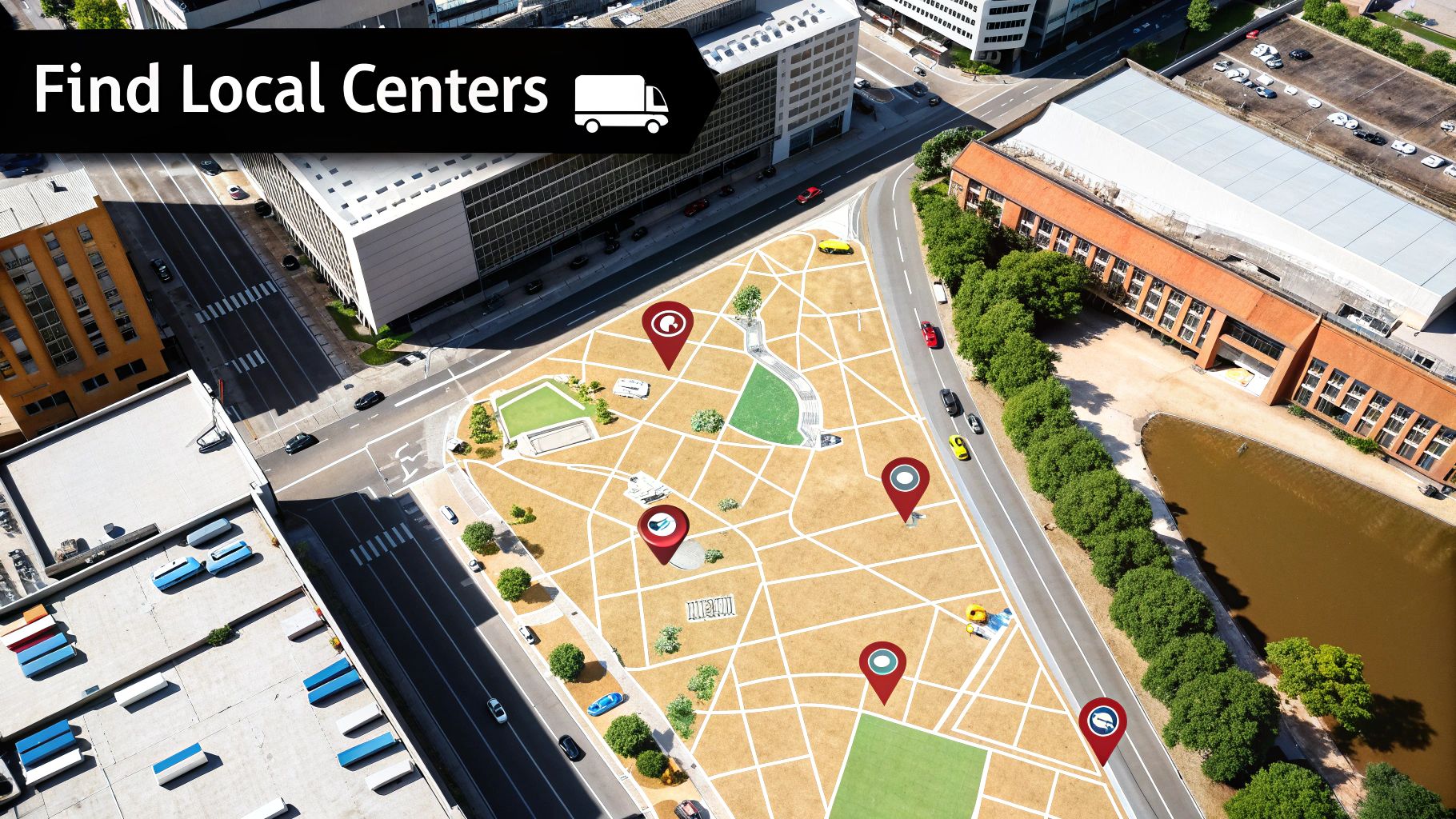
Alright, so you’ve found a buyer and settled on a price. Now what? A little bit of prep work at this stage can make the final pickup go off without a hitch. Taking a few moments to get things in order ensures the tow truck driver can get in and out quickly, making the whole process hassle-free for everyone.
First things first, clear out everything that’s yours. And I mean everything. You'd be surprised what gets left behind in cars—I've heard stories of everything from forgotten wallets to important documents. Check the glove box, the boot, under the seats, and in the centre console.
Sorting Out the Paperwork and Plates
This is the part you really want to get right. Before the driver arrives, you need to have your ownership documents handy. In most cases, this will be your Certificate of Registration, which is the official proof that you're the owner and have the right to sell or scrap the vehicle. Without it, things can grind to a halt pretty quickly.
Next up are the number plates. You’ll need to remove these from the car before it gets towed. It's your responsibility to return them to your local transport authority to officially cancel the registration. This is a non-negotiable step; it protects you from any future fines or tolls linked to that vehicle identification number.
Here's a pro tip from years of experience: After you've cleaned the car out, grab your phone and take a few quick photos of the interior and exterior. This creates a simple, timestamped record of its condition, which can prevent any disagreements about its state when the driver arrives.
Getting these details sorted is what makes for an easy scrap car removal in Adelaide or any other Aussie city. With your car cleared out and your documents ready, you’re all set for the final handover.
What's My Scrap Car Really Worth? The Valuation Breakdown
Ever wondered how a scrap yard lands on a specific cash offer for your old car? It's not just a random number. When you're searching for "vehicle recycling near me," knowing what goes into that quote gives you the upper hand and lets you know if you're getting a fair deal.
At its core, the valuation starts with the basics: your car's weight. The price is heavily tied to the current market rate for scrap metal, which can change daily. Most of a car is steel, but there’s also a fair bit of aluminium and other metals that all add up.
It's More Than Just a Lump of Metal
But a car is much more than just its weight in steel. The real value often lies in what can be salvaged and given a second life. If key components are still in decent shape, they can seriously boost the cash you walk away with.
Here are the parts that wreckers are really looking for:
- The Engine: A running engine? That’s the big-ticket item.
- The Transmission: A gearbox that still works properly is another high-value component.
- Catalytic Converters: These are packed with precious metals like platinum and palladium, making them surprisingly valuable.
- Alternators and Starter Motors: These are common parts that fail, so there's always a market for working second-hand ones.
This image gives a great overview of the whole vehicle recycling process and just how much we can recover from a single car.
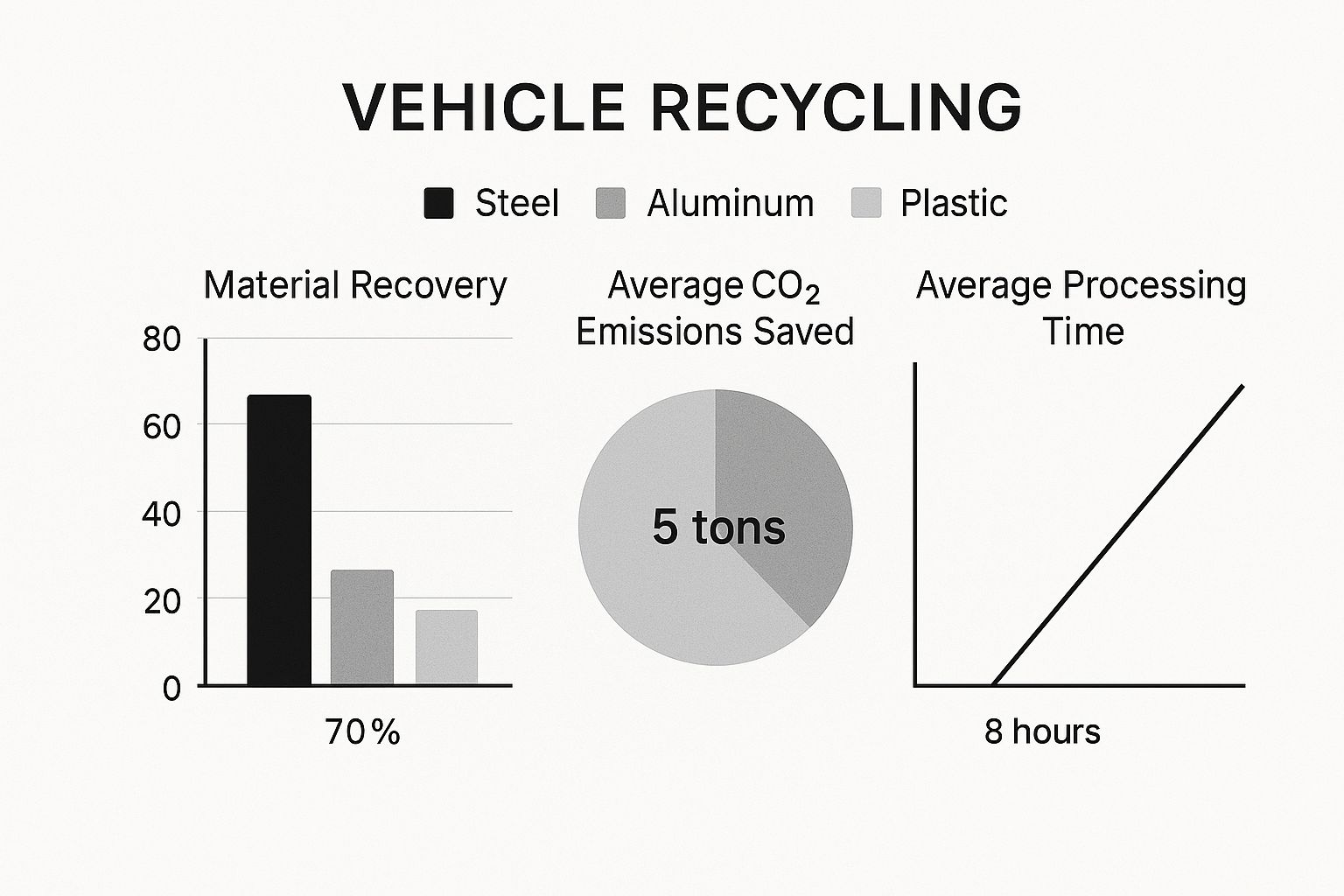
As you can see, modern recycling is incredibly efficient and has some massive environmental upsides.
So, What Can You Actually Expect to Get?
The final offer you get is a mix of your car's scrap metal weight and the value of all those reusable parts. To give you a clearer picture, here's a rough guide based on what we see every day.
Estimated Scrap Car Value by Condition
This table provides a general guide to what you might expect to be offered for your end-of-life vehicle based on its overall condition and key components.
| Vehicle Condition | Common Characteristics | Estimated Value Range (AUD) |
|---|---|---|
| End-of-Life / Wrecked | Non-running, major body damage, few salvageable parts. | $250 – $700 |
| Running but Rough | Still drivable but has significant mechanical or cosmetic issues. | $600 – $1,500 |
| Good Salvageable Parts | May not run, but the engine, transmission, or catalytic converter is in good shape. | $800 – $3,000+ |
| Late Model / In-Demand | A newer model with high-demand parts, even with some accident damage. | $2,000 – $9,000+ |
Remember, these are just estimates. The actual value can swing based on the daily price of metal and specific demand for your car's parts.
In Australia, the economic value of a scrap vehicle can be anywhere from a couple of hundred dollars to several thousand. A complete non-runner might only fetch between $300 to $800, but a car with plenty of good working bits could go for as much as $9,000. If you're keen to learn more, it's worth reading up on the finer details of what impacts scrap car worth.
The Handover: Finalising Paperwork and Cashing In
So, your car is all set for its final journey. The last piece of the puzzle is sorting out the paperwork and, of course, getting paid. This isn't just a formality; it's what legally wraps everything up and protects you down the track.
When the tow truck driver arrives, they'll have the necessary documents with them. You're mainly looking for a notice of disposal or a similar transfer of ownership form. The name might change slightly depending on which state you're in, but the goal is the same: to officially tell the local transport authority that the car is no longer yours. Signing this is your "get out of jail free" card for any future fines or tolls linked to that vehicle.
Getting Paid and Sealing the Deal
With the signatures done, it's time for the best part—the payment. Any decent local car recycler will have a simple and transparent payment process.
- Cash on the Spot: This is the most common and often the easiest way. The driver hands over the cash, and the deal is done. Simple.
- Instant Bank Transfer: Some services now offer on-the-spot bank transfers, which is great if you prefer not to handle a wad of cash. You should see the funds appear in your account almost immediately.
No matter how you get paid, always get a receipt. This isn't just a piece of paper; it's your proof of the transaction. It should clearly show the amount you received, the date, and the details of the car and the company you sold it to. Don't let them leave without giving you one.
Here's a pro tip that many people forget: your absolute final step is to cancel the vehicle's registration. As soon as you have that signed notice of disposal, you need to lodge it with your state's transport authority. If you skip this, you could still be on the hook for any fines that car racks up later.
Nailing this final step is non-negotiable. It ensures the vehicle is officially off your hands, the money is in your pocket, and you can walk away without a single worry.
Got Questions About Scrapping Your Car? We’ve Got Answers
If you’re typing "vehicle recycling near me" into a search bar, you probably have a few questions swirling around. It’s a process most people only go through once or twice, so it's natural to want some clarity. Let's tackle the big ones so you can move forward with confidence.
Do I Really Need Paperwork to Scrap My Car?
Absolutely. This is a crucial step and there’s no getting around it. Any legitimate car recycler will ask for proof of ownership, which is usually the vehicle's Certificate of Registration. It's a legal requirement designed to stop stolen vehicles from entering the scrap metal trade.
Lost your registration? Don't stress. You can usually get a replacement from your state's transport authority. It's worth asking the recycler what their specific requirements are, as some might accept other forms of proof, like your driver's licence matched with the car's VIN. The key is to have this sorted before they show up.
So, What Actually Happens to My Old Car?
Once your car is towed away, it doesn't just sit in a yard. It enters a highly organised dismantling process at a proper treatment facility. The first thing that happens is depollution. All the nasty fluids—oil, petrol, coolant, brake fluid—are drained and handled safely to protect the environment.
Then, the salvage operation begins. Technicians will strip the car of any valuable or reusable parts. We're talking about things like:
- The engine and transmission (if they’re in decent shape)
- Alternators, starter motors, and other electrical components
- Tyres and batteries
Finally, what's left—the metal shell—is crushed flat, shredded into small pieces, and sorted by metal type. This whole system is incredibly efficient, ensuring that over 90% of your car gets a second life as new products, which is a huge win for the circular economy.
While Australia does a pretty good job with auto recycling, there’s always room to do better. We have over 20 million registered vehicles on our roads, but estimates suggest only about 75% of end-of-life cars are properly recycled. This is why picking a licensed, professional service is so important—it guarantees your car is dealt with responsibly, not just dumped. You can read more about recent advancements in sustainable car recycling.
Let's Talk Money: What’s My Car Actually Worth?
This is the million-dollar question, isn't it? The truth is, the payout varies wildly. A small, older car that's seen better days might only fetch a couple of hundred dollars, mostly for its scrap metal weight.
On the other hand, if you've got a larger vehicle like a 4×4 or a van, or a car with parts that are in high demand, the price can climb much higher. A running engine, a solid transmission, or an undamaged catalytic converter can easily push the offer past the $1,000 mark. The best approach? Ring up a few different local services to compare offers. It's the only way to know you're getting a fair deal.
Ready to turn that old vehicle into cash? At Auto Removal Adelaide, we pay top dollar for cars in any condition and offer fast, free towing across the Adelaide area. Get Your Instant Quote Today!

